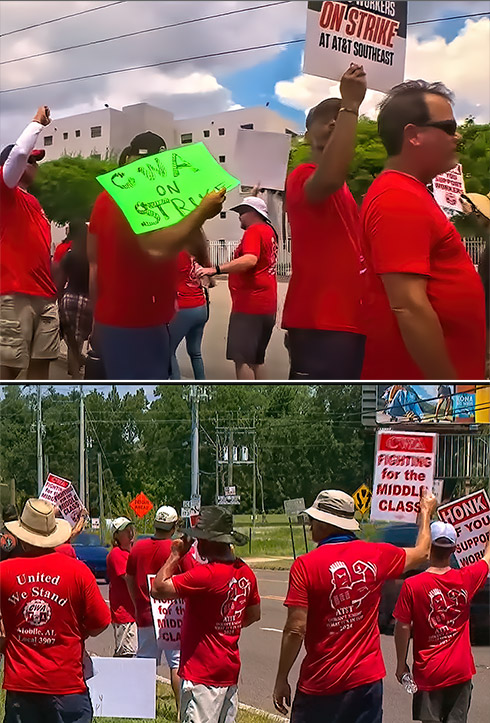
AT&T workers went on strike in the Southeast on F. In Florida, employees picketed in Miami (at top) and Pensacola.
UPDATE: The Communications Workers of America strike against AT&T Southeast continues into its sixth day, with reports of service outages and delays mounting across the Southeast.
In Eads, Tennessee, a striking worker was injured on the picket line by a vehicle driven by a contractor. “We were afraid something like this would happen,” said CWA District 3 Vice President Richard Honeycutt. “As a result of the strike, AT&T has been sending managers and contractors who do not necessarily have the proper training to work on installations and repairs. Our members have seen numerous safety violations at worksites across the Southeast. The public should use caution in those work zones.”
In a show of solidarity, Teamsters are refusing to cross picket lines to deliver packages to AT&T locations.
The Communications Workers of America (CWA), representing thousands of employees across the Southeastern United States, have initiated a strike against AT&T Southeast.
This action, which began Friday, involves over 17,000 technicians, customer service representatives, and support staff responsible for maintaining AT&T’s residential and business wireline telecommunications network across nine states, including Alabama, Florida, Georgia, and Tennessee.
The strike comes in response to what the CWA alleges are unfair labor practices by AT&T Southeast. The union has filed a formal charge with the National Labor Relations Board (NLRB), a federal agency responsible for enforcing U.S. labor law, accusing the company of failing to bargain in good faith, engaging in surface bargaining, and sending representatives without the authority to make binding decisions. According to the union, these actions violate the legal obligations inherent in collective bargaining, and they assert that AT&T has reneged on agreements previously reached during negotiations.
“Our union entered into negotiations in a good faith effort to reach a fair contract, but we have been met at the table by company representatives who were unable to explain their own bargaining proposals and did not seem to have the actual bargaining authority required by the legal obligation to bargain in good faith,” said CWA District 3 Vice President Richard Honeycutt. “Our members want to be on the job, providing the quality service that our customers deserve. It’s time for AT&T to start negotiating in good faith so that we can move forward towards a fair contract.”
AT&T, however, has disputed these claims. In a statement, the company asserted that the allegations made by the CWA are “not based in fact” and emphasized that it has been engaged in discussions with the union. AT&T also highlighted that it has successfully reached agreements with other CWA districts, including the West District, earlier this year.
As the strike continues, the impact on AT&T’s operations in the Southeast remains a point of concern. The company has pledged to ensure that services are not disrupted, but the long-term effects of the ongoing labor dispute are uncertain, which should be a cause for concern for all involved.
AT&T’s labor negotiations have drawn the attention of national figures, including members of Congress. In a letter dated July 26, 2024, several U.S. Congress members urged AT&T CEO John Stankey to engage in fair and good-faith negotiations with the CWA. The letter emphasized the importance of reaching an equitable agreement that benefits both the employees and the company, particularly in light of the critical broadband deployment and support roles these workers fulfill.
Meanwhile, AT&T is also embroiled in another significant issue concerning the allocation of the 4.9 GHz spectrum band. This spectrum is a valuable resource for wireless communication, and CEO John Stankey has advocated for its exclusive use by FirstNet, the nationwide first responder network operated by AT&T, amid opposition from other major wireless carriers like Verizon and T-Mobile.
The Communications Workers of America, which represents over 150,000 AT&T employees, has supported AT&T’s stance on this matter, arguing that allocating the band to FirstNet would enable a more efficient nationwide deployment. This support, however, stands in stark contrast to their current conflict with the company over labor practices.
As negotiations continue, the resolution of both the strike and the spectrum allocation issue will be closely watched by industry stakeholders and the broader public.

















